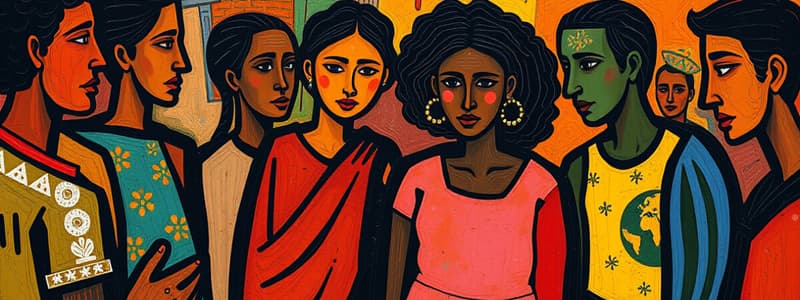Podcast
Questions and Answers
What is culture?
What is culture?
Culture is essential for survival and communication with other people, learned through interaction, observation, and imitation, and is fundamental for the survival of societies.
Which of the following are considered cultural universals? (Select all that apply)
Which of the following are considered cultural universals? (Select all that apply)
- Government systems
- Appearance (bodily adornment, hairstyles) (correct)
- Social institutions (family, law, religion) (correct)
- Activities (sports, dancing, games, joking) (correct)
What are symbols?
What are symbols?
Anything that meaningfully represents something else.
What is language?
What is language?
What are values in the context of culture?
What are values in the context of culture?
What are norms?
What are norms?
What are formal norms?
What are formal norms?
What distinguishes informal norms?
What distinguishes informal norms?
Which of the following examples are considered folkways? (Select all that apply)
Which of the following examples are considered folkways? (Select all that apply)
What are mores?
What are mores?
Define cultural lag.
Define cultural lag.
What is counter culture?
What is counter culture?
What does culture shock refer to?
What does culture shock refer to?
What is ethnocentrism?
What is ethnocentrism?
What is cultural relativism?
What is cultural relativism?
What is material culture?
What is material culture?
Define non-material culture.
Define non-material culture.
What are taboos?
What are taboos?
What is subculture?
What is subculture?
Flashcards are hidden until you start studying
Study Notes
Culture
- essential for survival and communication among individuals
- learned through interaction, observation, and imitation
- fundamental to societal existence and the essence of human social interaction
Cultural Universals
- include appearance (bodily adornment, hairstyles)
- cover activities like sports, dancing, games, and joking
- consist of social institutions such as family, law, and religion
- involve practices including cooking, folklore, and gift-giving
Symbols
- represent something else and hold significant meaning
Language
- a set of symbols used to express ideas and facilitate communication
Values
- collective beliefs about right, wrong, good, and bad
Norms
- established rules and standards of behavior
- prescriptive norms indicate acceptable behavior
- proscriptive norms identify unacceptable behavior
Formal Norms
- documented rules with specific punishments for violations, often represented as laws
Informal Norms
- unwritten standards understood by individuals within a shared identity
- violations may lead to informal social sanctions
Folkways
- everyday customs that can be violated without severe consequences
- examples include personal hygiene practices and appropriate attire for occasions
Mores
- strongly held norms with moral implications, violations may have serious repercussions
- include taboos, like the incest taboo, which is widely recognized as offensive
Laws
- formal norms codified by legislation and backed by sanctions
- distinguish between civil law (disputes among individuals/groups) and criminal law (public safety issues)
Cultural Lag
- the disparity between a society's technological advancements and its moral/legal institutions
Counter Culture
- groups that reject mainstream societal values and seek alternative lifestyles
- historical examples include beatniks, flower children, KKK, and skinheads
Culture Shock
- the anxiety experienced when encountering vastly different cultures
Ethnocentrism
- the belief in the superiority of one's own culture compared to others
Cultural Relativism
- understanding and analyzing another culture based on its own values and standards
Material Culture
- encompasses the physical objects and tangible creations made, used, and shared within a society
Non-Material Culture
- involves abstract or intangible aspects of culture, such as beliefs, attitudes, and values influencing behavior
Subculture
- groups with distinct values and behaviors that set them apart from the larger culture, creating a "world within a world"
Taboos
- behaviors that incur the most severe sanctions within a society
Studying That Suits You
Use AI to generate personalized quizzes and flashcards to suit your learning preferences.





